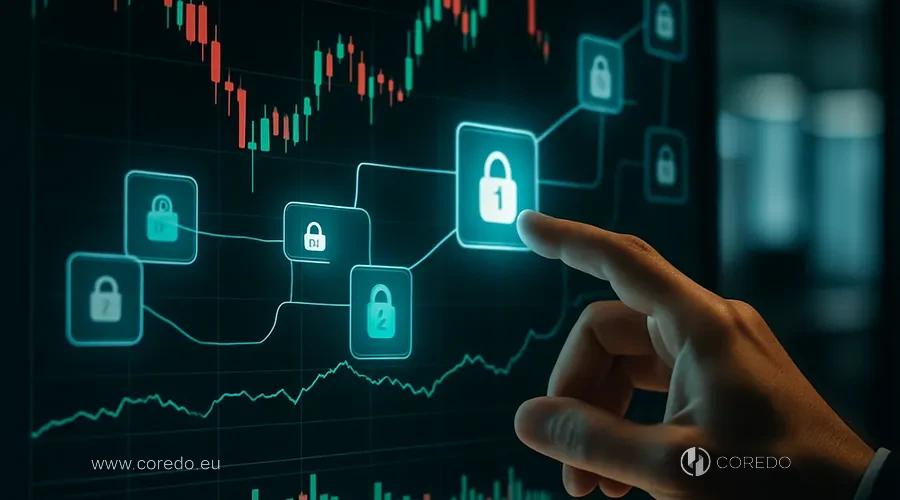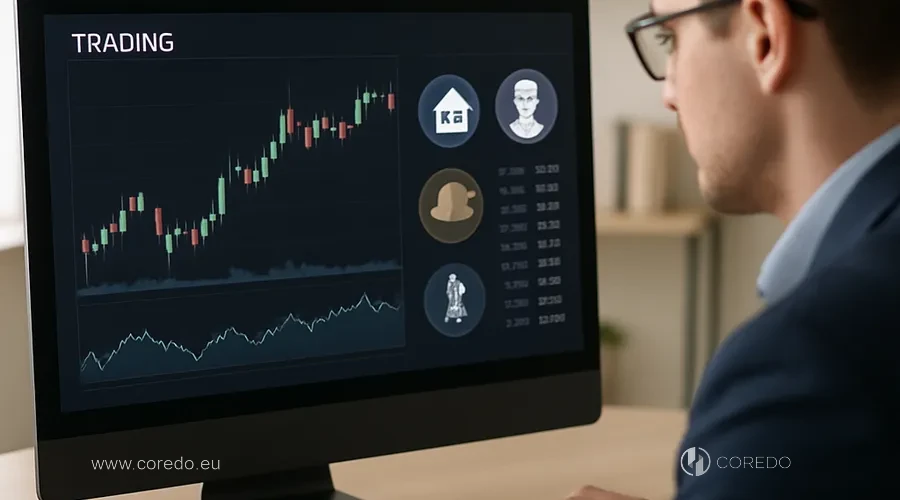In 2024 the global market volume of tokenized assets exceeded $6 trillion, and by 2030 analysts forecast it to grow to $16 trillion. But behind these impressive figures there is not only technological progress, but a new reality for brokers, investors and corporate structures: the tokenization of securities is changing the very foundations of the financial market, challenging familiar models and opening opportunities that five years ago were discussed only at industry conferences.
Why has asset tokenization become a key driver of the digital transformation of finance? How can brokerage firms not only survive but scale their business amid rapidly changing standards, tighter AML and KYC, and new requirements for legal support? And most importantly, how to extract strategic advantages from this process while minimizing risks?
The COREDO team faces these questions daily, supporting clients in the EU, Asia and the CIS at all stages – from registering legal entities and obtaining financial licenses to implementing comprehensive AML procedures and bringing tokenized products to international markets.
If you want not just to understand the topic but to get tools for strategic business development – read to the end. Here you will find answers to the most pressing questions and receive proven solutions based on COREDO’s experience.
Tokenization of securities and impact on brokerage activities

Such a transition affects key processes in brokerage activity, opening new opportunities for market participants and increasing the accessibility of instruments at the global level.
Tokenization of securities: what it is and how it works
Tokenization of securities is the process of transferring rights to traditional assets (stocks, bonds, shares, debt obligations) into digital form using a blockchain platform. In practice this means issuing digital tokens, each of which confirms the ownership right to a certain share of an asset.
It is smart contracts that make it possible to implement functions such as fractional ownership and the issuance of digital certificates of ownership, which make investments more accessible and more liquid.
Fundamentals of securities tokenization
Transparency and traceability of transactions, a fundamental principle implemented through the immutability of the blockchain ledger.
Security and token standards for securities — modern blockchain platforms support security standards (for example, ISO/TC 307, ERC-3643), which allows integrating tokenized assets with traditional financial systems and ensuring a high level of data protection.
Solutions developed at COREDO include comprehensive support for corporate risk management, integration of AML procedures and the formation of transparent business processes.
Impact of tokenization on brokerage activities
Tokenization allows brokers to launch new products (for example, tokenized ETFs, bonds, derivatives) and enter international markets with minimal infrastructure costs.
Improved liquidity of digital assets is achieved through fractional ownership and the ability for secondary trading of tokens 24/7 on global platforms.
Integrating tokens into traditional financial markets opens access to new classes of investors and allows tokenized assets to be used as collateral, a corporate financing tool, and even for building flexible investment strategies.
Characteristics of brokerage activity during asset tokenization

The characteristics of brokerage activity in asset tokenization manifest in new opportunities and requirements for market participants related to the digital representation of property rights through tokens.
The development of blockchain technologies and smart contracts changes conventional brokerage procedures, increasing transparency and transaction speed, as well as expanding access to various categories of assets.
Blockchain and smart contracts in brokerage operations
Implementing blockchain platforms (Ethereum, Tezos, Polygon, Hyperledger) for the issuance and circulation of digital securities provides not only automation of transactions but also transparency at all stages of an asset’s lifecycle.
Legal requirements for brokers of tokenized assets
Particular attention is paid to token ownership rights, protecting investors’ interests, and compliance with blockchain security standards.
COREDO’s solutions include developing internal policies, preparing legal documents, and support in obtaining licenses (including crypto, payment, and brokerage licenses).
Risk management and AML/KYC procedures
AML services for companies are becoming an integral part of tokenization processes.
In one COREDO case for an EU client, a system was implemented where each stage of issuing tokenized bonds was accompanied by an automated check for AML compliance, and all transactions were recorded in an immutable registry for subsequent audit.
The use of digital certificates and integration with international databases allow brokers to timely detect suspicious operations and minimize legal risks.
Thus, modern AML procedures become the foundation of trust in tokenization, after which the legal aspects of working with tokenized securities in different jurisdictions gain particular importance.
Legal aspects of securities tokenization in Europe, Asia and Africa

The legal aspects of securities tokenization in Europe, Asia and Africa are becoming increasingly significant against the backdrop of the global development of blockchain technologies and the emergence of new forms of digital assets.
Effective and secure tokenization requires compliance with international standards that define the legal frameworks for circulation, investor rights protection, and regulation of the tokens themselves in various jurisdictions.
International standards for securities tokenization
In Asia, key centers remain Singapore, Hong Kong and Japan, where their own regulatory sandboxes and licenses for digital securities operate.
Registration of tokenized companies by jurisdiction
Legal entity registration in the EU (for example, in the Czech Republic, Estonia, Cyprus) requires compliance with a number of procedures: name reservation, preparation of the articles of association, disclosure of beneficiary information, and KYC.
In Africa, where tokenization is only gaining momentum, adaptation to local AML and digital identification requirements is important.
Impact of new regulations on brokers and tokenization
International tokenization projects require compliance not only with European but also with Asian and African standards, which complicates legal support.
Tokenization in the brokerage business, performance evaluation

Tokenization in the brokerage business opens up new tools to increase efficiency and competitiveness in financial markets.
Metrics for assessing the ROI of securities tokenization
In COREDO projects, clients record infrastructure cost reductions of up to 40%, as well as increased transaction volumes due to entering new markets.
The impact of tokenization on capital structure is manifested in the ability to flexibly manage shares, issue new classes of tokens (for example, tokenized bonds or derivatives), and attract investments through digital platforms.
Scaling brokerage activities through tokenization
Scaling brokerageBusiness opportunities using tokens are realized through automation of processes, integration with decentralized finance (DeFi), and the ability to offer new products (tokenized ETFs, fractional investments, digital bonds).
COREDO’s experience shows: implementing DeFi solutions requires not only technical but also legal expertise to minimize regulatory risks.
Prospects for tokenization in Europe, Asia and Africa
In Asia and Africa, tokenization contributes to access to capital, lowering barriers for investors, and the development of new models of corporate governance.
COREDO’s implemented cases confirm: integration of tokenization with traditional financial instruments allows companies not only to optimize business processes but also to create sustainable competitive advantages in the global market.
Tips for entrepreneurs and brokers

- The tokenization of securities requires a strategic approach: from choosing a jurisdiction to implementing security standards and integrating AML/KYC procedures at all stages.
- Legal support for asset tokenization should include the preparation of all necessary documents, smart contract audits, and obtaining licenses in the chosen regions.
- When choosing a blockchain platform and technologies for tokenization, it is important to consider compatibility standards (for example, ERC-1400, FA2), integration capabilities with traditional markets, and security requirements.
- company registration, related to tokenization in the EU, Asia and Africa requires a comprehensive approach: from preparing corporate documents to undergoing KYC and AML procedures, as well as taking into account the specifics of local regulation.
- To assess the effectiveness of tokenization projects, use ROI metrics, analyze cost reductions, increased liquidity, and product line expansion. Risk management should be built on the integration of compliance, transparency of processes, and constant monitoring of changes in international regulation.
| Aspect | Traditional brokerage activity | Brokerage activity with tokenization |
|---|---|---|
| Asset ownership | Full, limited | Fractional ownership through digital tokens |
| Speed and transparency of transactions | Medium, with intermediaries involved | High, automation through smart contracts |
| Legal support | Standard | More complex, taking into account international regulation |
| Risk management | Traditional methods | Integration of AML/KYC, blockchain transparency |
| Scalability | Limited | High, thanks to digital tools |
Final thought: Tokenization is not just a technological trend, but a fundamental change in financial infrastructure. COREDO’s experience proves: only a comprehensive approach to legal, technological and compliance aspects allows entrepreneurs and brokers not only to adapt but also to become leaders of the financial revolution 3.0.